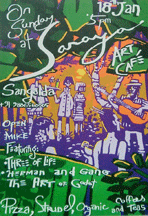A bank is a financial institution that accepts deposits from the public and creates credit.
The origins of modern banking can be traced to medieval and early Renaissance Italy, to the rich cities in the centre and north like Florence, Lucca, Siena, Venice and Genoa
Gradually the goldsmiths began to lend the money out on behalf of the depositor, which led to the development of modern banking practices; promissory notes (which evolved into banknotes) were issued for money deposited as a loan to the goldsmith. The goldsmith paid interest on these deposits. Since the promissory notes were payable on demand, and the advances (loans) to the goldsmith's customers were repayable over a longer time period, this was an early form of fractional reserve banking. The promissory notes developed into an assignable instrument which could circulate as a safe and convenient form of money backed by the goldsmith's promise to pay, allowing goldsmiths to advance loans with little risk of default. Thus, the goldsmiths of London became the forerunners of banking by creating new money based on credit.
Since the advent of EFTPOS (Electronic Funds Transfer at Point Of Sale), direct credit, direct debit and internet banking, the cheque has lost its primacy in most banking systems as a payment instrument. This has led legal theorists to suggest that the cheque based definition should be broadened to include financial institutions that conduct current accounts for customers and enable customers to pay and be paid by third parties, even if they do not pay and collect cheques .
Banks face a number of risks in order to conduct their business, and how well these risks are managed and understood is a key driver behind profitability, and how much capital a bank is required to hold. Bank capital consists principally of equity, retained earnings and subordinated debt.
After the 2007-2009 financial crisis, regulators force banks to issue Contingent convertible bonds (CoCos).These are hybrid capital securities that absorb losses in accordance with their contractual terms when the capital of the issuing bank falls below a certain level. Then debt is reduced and bank capitalization gets a boost. Owing to their capacity to absorb losses, CoCos have the potential to satisfy regulatory capital requirement.
An overdraft occurs when money is withdrawn from a bank account and the available balance goes below zero. In this situation the account is said to be "overdrawn". If there is a prior agreement with the account provider for an overdraft, and the amount overdrawn is within the authorized overdraft limit, then interest is normally charged at the agreed rate. If the negative balance exceeds the agreed terms, then additional fees may be charged and higher interest rates may apply.
Bank fees – The bank charges a fee unexpected to the account holder, creating a negative balance or leaving insufficient funds for a subsequent debit from the same account.
In modern business practice, a letter of credit (LC) also known as a Documentary Credit, is a written commitment by a bank issued after a request by an importer (foreign buyer) that payment will be made to the beneficiary (exporter) provided that the terms and conditions stated in the LC been met, as evidenced by the presentation of specified documents.
Methods of payment for goods ordered:
A letter of credit is a method of payment that is an important part of international trade. They are particularly useful where the buyer and seller may not know each other personally and are separated by distance, differing laws in each country and different trading customs. It is generally considered that Letters of Credit offer a good balance of security between the buyer and the seller, because both the buyer and seller rely upon the security of banks and the banking system to ensure that payment is received and goods are provided. In a Letter of Credit transaction the goods are consigned to the order of the issuing bank, meaning that the bank will not release control of the goods until the buyer has either paid or undertaken to pay the bank for the documents.
In the event that the buyer is unable to make payment on the purchase, the seller may make a demand for payment on the bank. The bank will examine the beneficiary's demand and if it complies with the terms of the letter of credit, will honor the demand. Most letters of credit are governed by rules promulgated by the International Chamber of Commerce known as Uniform Customs and Practice for Documentary Credits. The current version, UCP600, became effective July 1, 2007. Banks will typically require collateral from the purchaser for issuing a letter of credit and will charge a fee which is often a percentage of the amount covered by the letter of credit.
Documentary Credit (more secure for seller as well as buyer) — Subject to ICC's UCP 600, the bank gives an undertaking (on behalf of buyer and at the request of applicant) to pay the beneficiary the value of the goods shipped if acceptable documents are submitted and if the stipulated terms and conditions are strictly complied with. The buyer can be confident that the goods he is expecting only will be received since it will be evidenced in the form of certain documents called for meeting the specified terms and conditions while the supplier can be confident that if he meets the stipulations his payment for the shipment is guaranteed by bank, who is independent of the parties to the contract.
Documentary collection (more secure for buyer and to a certain extent to seller) — Also called "Cash Against Documents". Subject to ICC's URC 525, sight and usance, for delivery of shipping documents against payment or acceptances of draft, where shipment happens first, then the title documents are sent to the buyer's bank by seller's bank, for delivering documents against collection of payment/acceptance.
Direct payment (most secure for buyer) — The supplier ships the goods and waits for the buyer to remit the bill, on open account terms.
Now these were the methods before 30 years and I have shared with you my experience, but economy makes new approaches with the technology advance, and here is where your skills of human relationship will come into play.. Do not venture into unknown waters without finding it from your own banker and that is why I call him a pillar on which your business will stand. It is always risky to take advice from others whom you do not know well.
| < Prev | Next > |
|---|













